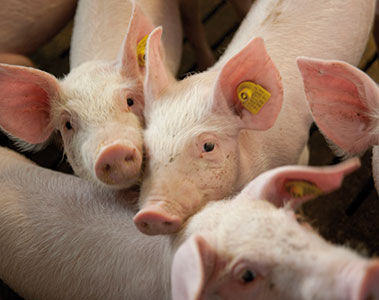
-
Global/EN
- Global
- North America
- Latin America
Proper piglet care is crucial to the success of any pig production operation. At this delicate stage of life, maximizing piglet nutrition and piglet performance is paramount. Moreover, pig producers at all stages of the production chain are facing challenges such as:
Three Pillar Piglet Care Program
Addressing these concerns while improving piglet health and reducing piglet mortality requires a multi-faceted approach.
At dsm-firmenich, we partner with you to help you transform the health and welfare of your piglets. Our local swine experts will work with you to co-create programs tailor-made to your objectives, your concerns, and your market, all utilizing our approaches to prepare, protect and support resilience of your piglets. With innovative and proven nutritional solutions and services, we are dedicated to helping secure your future.
Immune competence is a natural and cost-efficient way to take a preventive approach to maximize piglet health and piglet nutrition. However, many factors can compromise a piglet’s immune system:
Our multi-faceted approach starts by targeting piglet immune competency via early microbial colonization of the gut and systemic immune transfer from sows to piglets. With our alternative nutritional solutions via sow’s nutrition, milk replacers and creep feed, we can help produce the heaviest and strongest piglets at weaning by developing immune competence.
Watch Part 1 of the Shaping the Future of Piglet Care webinar series, and learn how to prepare your piglets for a bright future by optimizing immune competency development. Three leading experts discuss how to optimize piglet immune competency development via two paths, systemically via sow nutrition and locally via microbiome shaping.
Gut functionality is a key target during the acute phase of weaning to help meet antibiotic reduction goals. There are several common reasons why piglets’ gut functionality could be compromised:
Supporting the healthy functioning of the gut is the second step in our approach. This step focuses on deactivating negative anti-nutrients in feed and reducing their effects on the gut thus helps to avoid piglet leaky gut, reduce local inflammation and tackle Gram-negative bacteria.
We propose dedicated nutritional solutions via piglet feed, with optimum feed recommendations and formulation coupled with anti-nutrient quantity evaluation (e.g., fiber, phytate, mycotoxins, etc.) to avoid gut dysfunctions such as piglet diarrhea.
Piglet Gastrointestinal Functionality
For producers to raise healthy pigs and to avoid the use of antibiotics, optimal gastrointestinal functionality, are critical.
Watch Pig Progress webinar on-demand. Our speakers discuss the topic of optimizing gastrointestinal functionality of piglets in relation to sow health & its effect on progeny, the role of sanitary conditions and protein nutrition in piglet gut health and how precision approaches to nutrition and health can support better production outcomes.
Watch Part 2 of the Shaping the Future of Piglet Care webinar series on-demand. Our speakers discuss optimizing gastrointestinal functionality through a combined approach of deactivating anti-nutrients, both from the feed and the gut microbiome.
Optimized digestive efficiency and nutrient supply is critical to shorten the growth lag post-weaning and support genetic potential. Early performance during the post-weaning period affects overall swine performance and production cost. Our goals are to:
We help pigs perform closer to their genetic potential by shortening the resilience period. To do this, we optimize digestive efficiency by unlocking feed nutrients that enhance growth, health and cost efficiency.
Our nutritional solutions support growth, piglet health and cost efficiency by using optimal and intelligent digestibility enhancers to help you get the most out of piglet feed ingredients and reduce gut inflammation due to antigens from feed.
Watch Part 3 of the Shaping the Future of Piglet Care webinar series on-demand. Our speakers discuss enhancing digestive efficiency and closing the gap between genetic potential and actual production performance.